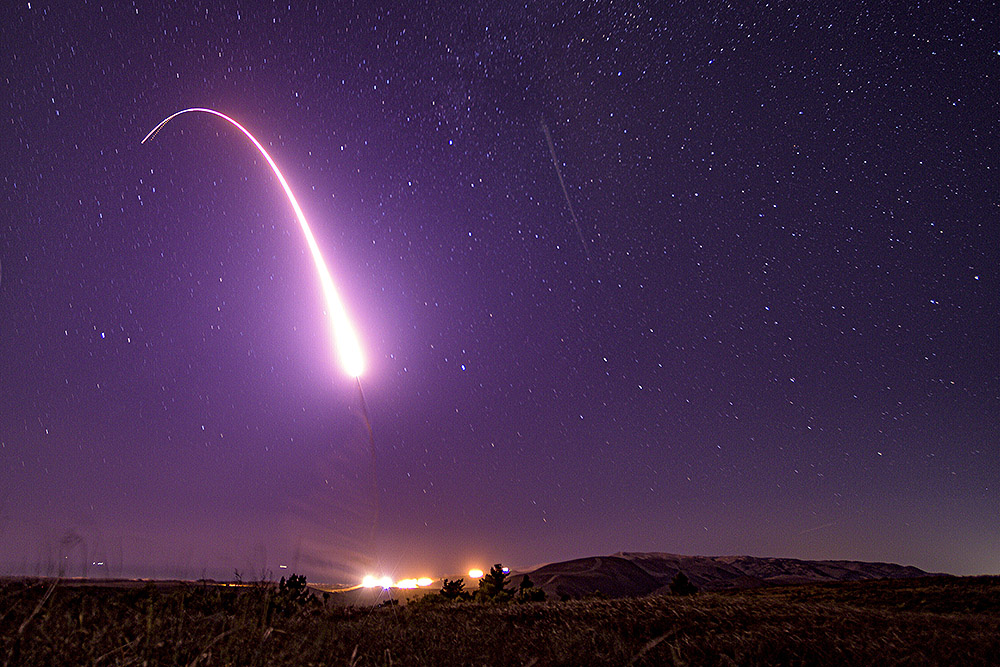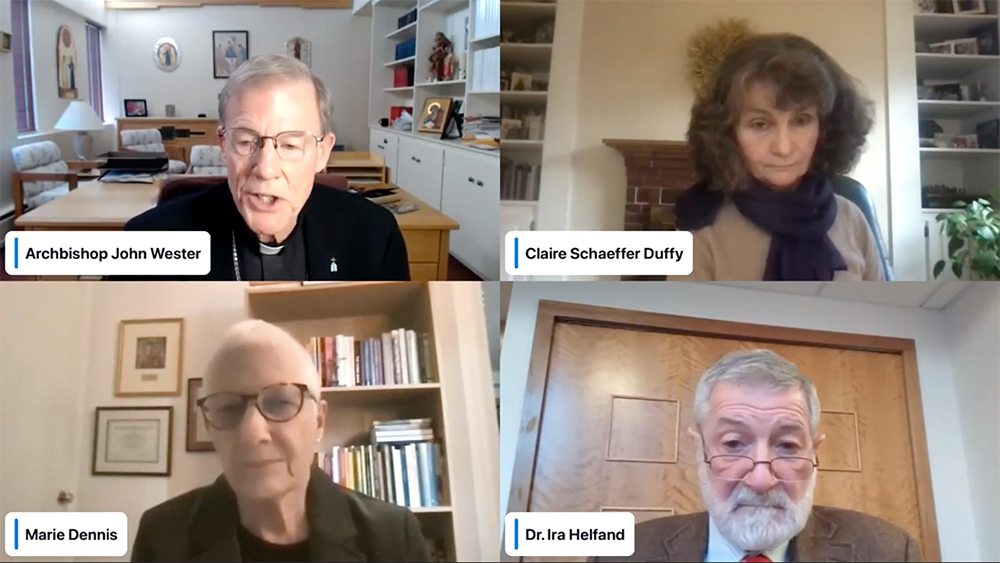
This image taken with a slow shutter speed on Oct. 2, 2019, and provided by the U.S. Air Force shows an unarmed Minuteman 3 intercontinental ballistic missile test launch at Vandenberg Air Force Base, California. (U.S. Air Force via AP/Staff Sgt. J.T. Armstrong)
In the estimation of longtime peace advocate Marie Dennis, a gradual shift is taking place in communities, churches and schools around the world to embrace nonviolence in solving conflict.
From religious leaders in the Democratic Republic of Congo to neighborhoods in her hometown of Washington, D.C., people are coming together to seek new and creative paths to build peaceful communities, she said.
They may be small steps, but the glimmers in everyday life give her hope that conflict and even wars, including nuclear war, eventually can be overcome, Dennis told National Catholic Reporter following a Jan. 27 webinar hosted by Pax Christi USA and the Pax Christi Massachusetts chapter.
The webinar marked the third anniversary of the Treaty on the Prohibition of Nuclear Weapons coming into force on Jan. 22, 2021.
Dennis, senior director of the Catholic Nonviolence Initiative and past co-president of Pax Christi International, told a global audience of more than 500 viewers that she believes that "humanity is on the threshold of a new way of being, a new paradigm, a new logic for life, and that embracing Gospel nonviolence at the center of Catholic life and teaching will help us move in that direction."
Within the Catholic community, Dennis credited the "visionary" work of communities of women religious for helping people from all walks of life "realize that we humans are part of an enormous beautiful creation."
Advertisement
"This new nonviolent paradigm toward which we are moving is based on a very different understanding of our place as humans in the spectacular cosmic reality that we are just now beginning to see," in the images of the Hubble and James Webb space telescopes as well as other scientific discoveries, she said. "Cosmic consciousness affects who we are, how we live, everything we do; the ground has shifted; the context for every dimension of life is different."
The webinar also featured Archbishop John Wester of Santa Fe, New Mexico, and Ira Helfand, past president of Physicians for Social Responsibility.
In 2022, Wester authored a pastoral letter, "Living in the Light of Christ's Peace: A Conversation Toward Nuclear Disarmament." In it, he called for widespread dialogue among government leaders, the nuclear weapons industry, peacemakers and clergy to achieve nuclear disarmament.
During the webinar, the archbishop compared the task ahead to that of David in his confrontation with Goliath and God's plan to replace Saul with someone who was humble and faithful as the king of the Jewish people, as told in the Book of Samuel.
"So, too, must we be prophets warning of the nuclear dangers," Wester told participants. "So, too, must we be humble and faithful to God while bringing down the Goliath of nuclear weapons. We know that it's not God's purpose to end humanity in radioactive ashes. Instead, he wants to elevate the human race to light and salvation. But God's purpose is worked through his instruments. So, let us get to work."
He said he plans to step up efforts within the U.S. Conference of Catholic Bishops in urging his fellow prelates "to adopt the issue of nuclear disarmament as a pro-life issue." Such a step, he explained, would bring the bishops' conference in line with the Vatican's ratification of the Treaty on the Prohibition of Nuclear Weapons, as well as Pope Francis' frequent statements during his papacy about the immorality of possessing nuclear weapons and planning for their possible use.
Wester asked, "After all, how can it not be a critical pro-life issue to ban the only weapons that could end human civilization overnight?"
'We know that it's not God's purpose to end humanity in radioactive ashes.'
—Archbishop John Wester
Helfand, who also is a member of the International Steering Group of the Geneva-based International Campaign to Abolish Nuclear Weapons, stressed the importance of starting a new round of nuclear weapon reductions. He said the general public has largely overlooked how much of a threat nuclear weapons pose to all life on Earth.
"We must remind ourselves the threat of nuclear weapons is real. It's greater than it's ever been," Helfand said, citing statements by Russian President Vladimir Putin to consider using battlefield weapons against Ukraine and brewing tensions in the Middle East and South Asia.
He described the scenario of a nuclear exchange involving just two cities: New York and Moscow. A single nuclear explosion would create a fireball 2 miles wide and 600 mile an hour winds, leaving all people, buildings, trees and anything else above ground level vaporized, he said.
Within 6 miles the heat would be intense enough to melt automobiles, and within 16 miles everything flammable would burn, Helfand said. "There would be hundreds of thousands of fires that would coalesce into a firestorm 32 miles across ... all oxygen would be consumed."
Helfand estimated the death toll in New York and Moscow would be 12 million to 15 million and 9 million to 10 million, respectively, with an exponential number of deaths in other cities under attack.
The trio of speakers urged viewers to call on members of Congress and the White House as well as to work with friends, neighbors, fellow churchgoers, labor unions and civic groups to which they may belong to initiate global action to dismantle the arsenals of the world's nine nuclear powers.

Speakers address a global audience of more than 500 viewers during a Jan. 27 webinar, "Building a World Without Nuclear Weapons: An Urgent Imperative," hosted by Pax Christi USA and the Pax Christi Massachusetts chapter. (NCR screenshot/YouTube/PaxChristiUSA)
The Stockholm International Peace Research Institute in 2023 estimated that 12,512 nuclear weapons remain, including 9,576 that are considered "potentially operationally available."
While the U.S. and Russia possess 90% of the world's atomic weapons, China, France, Great Britain, India, Israel, North Korea and Pakistan also maintain nuclear arsenals.
Helfand pointed to the series of nuclear disarmament agreements negotiated in the 1970s and 1980s that led to significant reductions in armaments in the U.S. and Russia. Today, one such treaty, New START, remains. However, Russia in August 2022 said it had suspended its participation in it. The pact is set to expire in 2026.
Helfand expressed confidence that if people act and publicly address their concerns about nuclear weapons as they did four decades ago with demonstrations, lobbying and widespread education, government leaders will undertake disarmament at a reasonably quick pace.
"We need to create the political will and to create the conditions for our leaders to get rid of nuclear weapons once and for all," Helfand said, while pointing participants to the website of the Back from the Brink campaign, preventnuclearwar.org.
The Treaty on the Prohibition of Nuclear Weapons resulted from months of negotiations led by non-nuclear nations at the United Nations in 2017. Although it was approved by 122 nations, the nine nuclear nations and those under the U.S. nuclear umbrella opposed the measure. Through Jan. 30 this year, 93 nations had ratified the treaty or joined it through accession, according to the United Nations Office for Disarmament Affairs.








